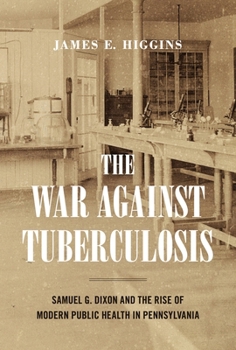The War Against Tuberculosis: Samuel G. Dixon and the Rise of Modern Public Health in Pennsylvania
In 1905, sanitary conditions in Pennsylvania were appalling. Thousands of children died of preventable and curable diseases, tens of thousands in the coal regions hacked themselves to death from black lung disease, and pollution in the commonwealth's water killed tens of thousands more. In the wake of an alarming typhoid outbreak in Butler, the Pennsylvania legislature formed a modern state department of health. At its head was Samuel G. Dixon, who would rise to fame as one of the most respected public health experts of his day.
While the legislation that created Pennsylvania's department of health cleared space for its aggressive action, it was Dixon's deft political touch and keen insight that enabled the department to avoid destruction at the hands of a people notoriously hostile to government encroachment. As commissioner, Dixon constructed the world's largest, most sophisticated system of tuberculosis controls, with thousands of beds in three great sanatoria. As his reputation grew, Dixon was recognized as one of the nation's greatest public health reformers and a champion of technology as the answer to great societal problems. At the same time, Dixon was a eugenicist who helped author a marriage law prohibiting unions between the diseased, those with intellectual disabilities or psychiatric disorders, alcoholics, and the "unfit."
This compelling history of Pennsylvania's first commissioner of public health provides a fascinating view into the changes wrought by germ theory and the public health efforts that stemmed from it during the Progressive Era in the United States.





